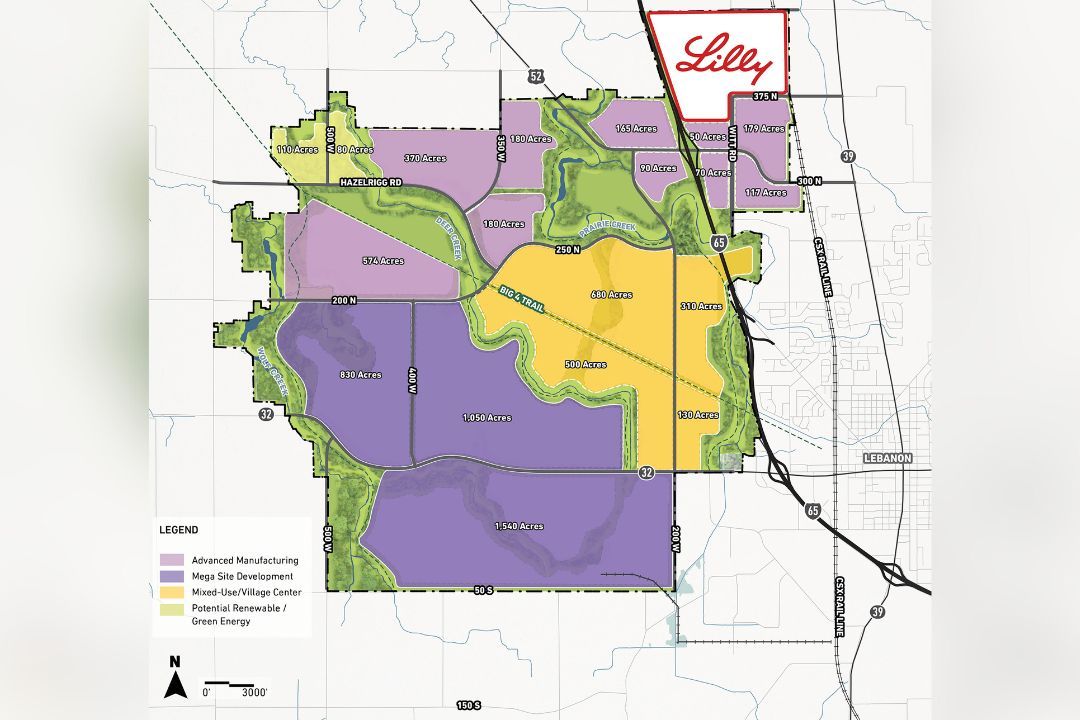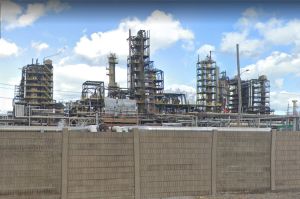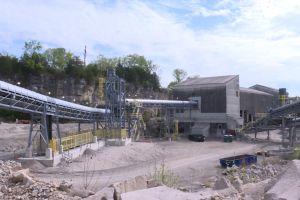
A proposed map of the LEAP Innovation District in Boone County, taken from the state website on May 14, 2025. (From the IEDC’s LEAP webpage)
After buying thousands of acres in Boone County to home a contentious technology park, the Indiana Economic Development Corp. (IEDC) quietly listed two purchases for sale one month ago. Prices for both are less than what state taxpayers paid two years ago for the properties.
The Limitless Exploration/Advance Pace Research and Innovation District — LEAP, for short — has been pitched as a future competitor with North Carolina’s Research Triangle. Developers with the IEDC landed on Boone County due to its location halfway between Indianapolis and Purdue University, with access to a major interstate.
As of October, the IEDC has spent almost $427 million on roughly 5,800 acres tied to the project. Initially the state planned to purchase up to 11,000 acres.
Both of the parcels — at 2009 W 250 N and 1502 W 525 N in Lebanon — are listed for sale on Realtor.com with the same real estate agent.
In a statement, the IEDC confirmed that those two homes are the only two currently listed for sale by the IEDC.
“The IEDC is in the process of analyzing all land assets within the LEAP District. As part of that analysis, the IEDC identified two purchased properties that were necessary at the time for access and annexation, but no longer warrant the state maintaining to support current and future investments. For these reasons, it has been determined that the best path forward is to list and sell portions of these two properties, eliminating maintenance expenses and better aligning with the long-term vision for the site,” said Erin Sweitzer, who oversees communications for the IEDC.
“To date, the purchase of land and the development of the LEAP District has resulted in the IEDC securing more than $18 billion in committed long-term investments for critical life sciences, (research and development) and data center projects, with resulting land sale proceeds already being returned to the state’s general fund,” Sweitzer continued.
The IEDC as real estate developer
From the beginning, the agency has said its purchases will not be kept in the long term, but rather sold to the companies investing in LEAP.
Eli Lilly, the first announced tenant, bought 605 acres from the state in April 2023 for $60 million, breaking ground on a $4.5 billion facility last week in the first phase of its planned $18 billion investment. Outside of Lilly, Facebook’s parent company, Meta, has struck a “tentative deal.” No other companies have openly committed to the site.
One of the homes appears to be just north of the planned Lilly site, a single-acre site originally purchased for $840,000. The three-bedroom home is now listed for $649,900, a 23% price cut.
The other house was part of a 20-acre purchase for $2.8 million. The slimmed down posting on Realtor.com includes eight acres and the original four-bedroom home and sits just south of where Prairie Creek intersects with Highway 52 — a place the LEAP website said could be used for mixed development or a village center.
In 2023, the assessed value for the 12 acres was $47,500 while the house and eight acres was $819,500.

Long-time LEAP opponents celebrated the listings as a sign that the IEDC is “reconsidering” the project after years of pushback.
“I guess it tells us that they’re reevaluating how they’re doing things and … realized that maybe they shouldn’t have bought quite so much or bitten off as much as what they’ve done,” said Brian Daggy, a Boone County resident.
Daggy and other members of the Boone County Preservation Group have criticized the project’s lack of transparency, maintaining that the state shouldn’t act as a developer and potentially overpay to purchase land on the taxpayer dime.
“I have no objection … if a farmer gets an offer and wants to sell property for development. It’s his property; he has that right to do so,” said Daggy. “But when the state entity, such as IEDC, comes in and starts offering huge premiums for property and using taxpayer money with no accountability, it really … doesn’t lend itself to fiscal responsibility or oversight.”
Daggy said his wife and fellow board member, Peggy, is a former realtor and noted the listings a few days before the “For Sale” sign appeared on the neighboring parcel. Like other area landowners, the state asked whether they’d be interested in selling their property. The Daggys declined.
The state “clearly overpaid” for the home on the northern edge of the Lilly allotment, Daggy said, and was an example of the state buying property with no clear objective. Lilly, even in older maps, has been the northern boundary for the LEAP project.
“I don’t know of too many properties where, actually, the price has gone down in the last two years. If anything, appreciation has accelerated,” said Daggy.
But Lebanon Mayor Matt Gentry said the sales don’t indicate any slowing or pivot on behalf of the LEAP project, noting that the IEDC is still responsible for maintaining and mowing homes they own.
“Maybe the IEDC just came to the conclusion of, ‘Let’s just resell these to someone who wants to buy them,’” said Gentry. “They were probably more interested in the land that came with the purchase.”
Gentry led a nearly two-hour city council meeting Monday evening, during which the government body accepted eight small parcels for voluntary annexation explicitly as part of the LEAP taxing district.
“I don’t think LEAP is slowing down at all,” Gentry concluded.
What’s ahead for IEDC, Lebanon?
The IEDC has been reticent to share LEAP details from the beginning, citing a need to keep ongoing negotiations private until it reaches a final deal.
“I understand the frustration, certainly,” emphasized Gentry. “But, unfortunately, that’s kind of the nature of these economic development deals. We were talking with Meta for more than two years before they were willing to kind of publicly announce…”

Gentry pointed to the $4 billion SK hynix investment in Tippecanoe County, where developers have wrangled with locals to identify a potential location more than a year after announcing the planned advanced chip packaging facility.
“I’ve always seen this as a 25- to 50-year project, so I’m not frustrated by the speed of it,” said Gentry, who acknowledged the national economic headwinds may slow current progress. “But, at the end of the day, the concept of LEAP is strong.”
But Daggy tied overall transparency concerns with a governor-ordered forensic audit of the IEDC’s finances. Gov. Mike Braun, who repeatedly criticized the quasi-public state agency during his gubernatorial run, also froze funds to an economic development “partner” and the IEDC’s foundation arm, the latter of which funded nearly all of former Gov. Eric Holcomb’s international travel.
Results from that audit aren’t expected for months.
Daggy also noted that the state-purchased land in Boone County doesn’t supply valuable property tax dollars to the City of Lebanon — coinciding with a property tax restructuring that will further dent future incomes for local governments.
The property tax plan championed by and signed into law by Braun will curb future property tax growth with the explicit goal of lowering bills for homeowners but will cost counties a combined $386 million in future revenues.
Boone County accounts for $7 million of that loss, according to a fiscal note from late April.
But Gentry noted that the owners of newly accepted annexed land weren’t paying property taxes to Lebanon in the first place. Those dollars were paid to county and township coffers.
Additionally, farmland — which accounts for most of the purchases — is taxed at a lower property tax rate.
“It’s worth some short-term loss while the land is assembled and planned for,” said Gentry. “In the long run, it will certainly generate way more in property taxes than it does today.”











